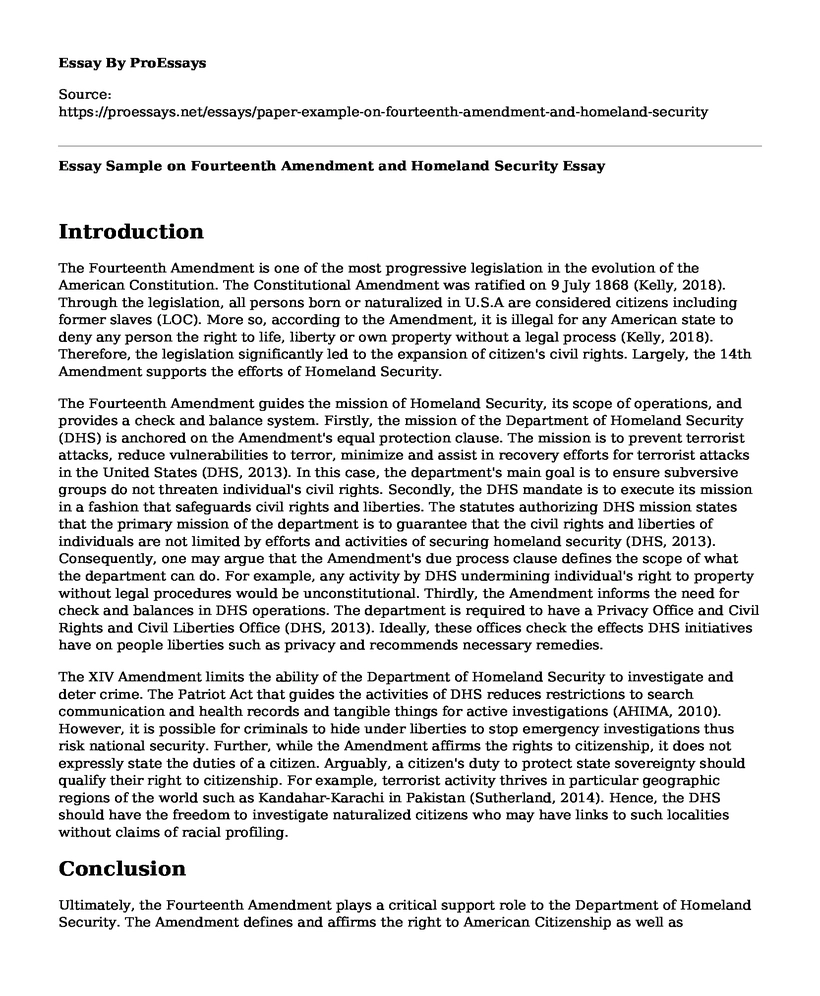Introduction
The Fourteenth Amendment is one of the most progressive legislation in the evolution of the American Constitution. The Constitutional Amendment was ratified on 9 July 1868 (Kelly, 2018). Through the legislation, all persons born or naturalized in U.S.A are considered citizens including former slaves (LOC). More so, according to the Amendment, it is illegal for any American state to deny any person the right to life, liberty or own property without a legal process (Kelly, 2018). Therefore, the legislation significantly led to the expansion of citizen's civil rights. Largely, the 14th Amendment supports the efforts of Homeland Security.
The Fourteenth Amendment guides the mission of Homeland Security, its scope of operations, and provides a check and balance system. Firstly, the mission of the Department of Homeland Security (DHS) is anchored on the Amendment's equal protection clause. The mission is to prevent terrorist attacks, reduce vulnerabilities to terror, minimize and assist in recovery efforts for terrorist attacks in the United States (DHS, 2013). In this case, the department's main goal is to ensure subversive groups do not threaten individual's civil rights. Secondly, the DHS mandate is to execute its mission in a fashion that safeguards civil rights and liberties. The statutes authorizing DHS mission states that the primary mission of the department is to guarantee that the civil rights and liberties of individuals are not limited by efforts and activities of securing homeland security (DHS, 2013). Consequently, one may argue that the Amendment's due process clause defines the scope of what the department can do. For example, any activity by DHS undermining individual's right to property without legal procedures would be unconstitutional. Thirdly, the Amendment informs the need for check and balances in DHS operations. The department is required to have a Privacy Office and Civil Rights and Civil Liberties Office (DHS, 2013). Ideally, these offices check the effects DHS initiatives have on people liberties such as privacy and recommends necessary remedies.
The XIV Amendment limits the ability of the Department of Homeland Security to investigate and deter crime. The Patriot Act that guides the activities of DHS reduces restrictions to search communication and health records and tangible things for active investigations (AHIMA, 2010). However, it is possible for criminals to hide under liberties to stop emergency investigations thus risk national security. Further, while the Amendment affirms the rights to citizenship, it does not expressly state the duties of a citizen. Arguably, a citizen's duty to protect state sovereignty should qualify their right to citizenship. For example, terrorist activity thrives in particular geographic regions of the world such as Kandahar-Karachi in Pakistan (Sutherland, 2014). Hence, the DHS should have the freedom to investigate naturalized citizens who may have links to such localities without claims of racial profiling.
Conclusion
Ultimately, the Fourteenth Amendment plays a critical support role to the Department of Homeland Security. The Amendment defines and affirms the right to American Citizenship as well as safeguarding civil rights and liberties. Positively, the legislation informs the mission and scope of the security department as well as providing the needs for checks and balance systems. However, the Amendment limits the ability of the department to interfere with individual rights such as privacy while deterring and investigating the crime. Progressively, balancing the need to protect individual liberties and guarantee national security will remain a delicate act.
References
Library of Congress. (LOC). (n.d). The 14th Amendment to the U.S. Constitution. Retrieved from: https://www.loc.gov/rr/program/bib/ourdocs/14thamendment.html. Accessed 3 December 2018.
Sutherland, D. W. (2014). Homeland Security and Civil Liberties: Preserving America's Way of Life. Notre Dame Journal of Law, Ethics & Public Policy, 19(1), 289.
AHIMA. (2010 November). Homeland security act, Patriot Act, Freedom of Information Act, and HIM-retired. Retrieved from: http://bok.ahima.org/doc?oid=106172#.XATiGzFoS00. Accessed 3 December 2018.
Department of Homeland Security. (DHS). (2013 March 1). Civil rights/civil liberties impact assessment: DHS support to the national network of fusion centres. Retrieved from: https://www.dhs.gov/sites/default/files/publications/crcl-impact-assessment-national-fusion-centers-2013_0.pdf. Accessed 3 December 2018.
Kelly, M. (2018 July 6). 14th Amendment summary. ThoughtCo. Retrieved from: https://www.thoughtco.com/us-constitution-14th-amendment-summary-105382. Accessed 3 December 2018.
Cite this page
Essay Sample on Fourteenth Amendment and Homeland Security. (2022, Oct 17). Retrieved from https://proessays.net/essays/paper-example-on-fourteenth-amendment-and-homeland-security
If you are the original author of this essay and no longer wish to have it published on the ProEssays website, please click below to request its removal:
- Essay Example on White-Collar Crime and Deviance
- Essay Sample on Private Transportation and Fleet Management
- The Causes for United States' Expansionist Foreign Policies During 1880-1929
- Essay Sample on Juvenile Justice: From Punishment to Rehabilitation
- Essay on OPP Detective Utilizes Reid Technique to Compel Serial Killer's Confession
- U.S Constitution: Origins, Roles & Duties - Essay Sample
- Democracy in America: From Jacksonian Era to Civil War - Essay Sample







